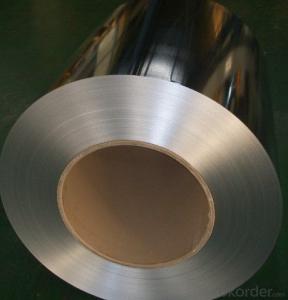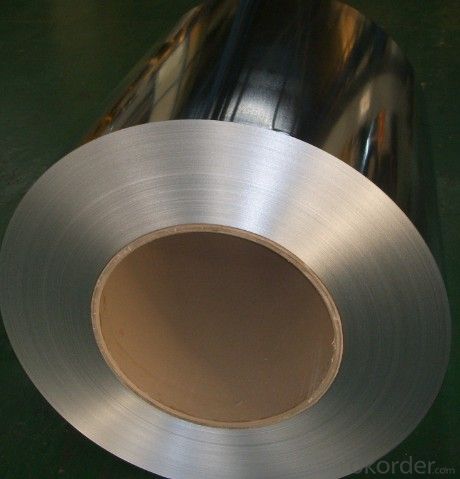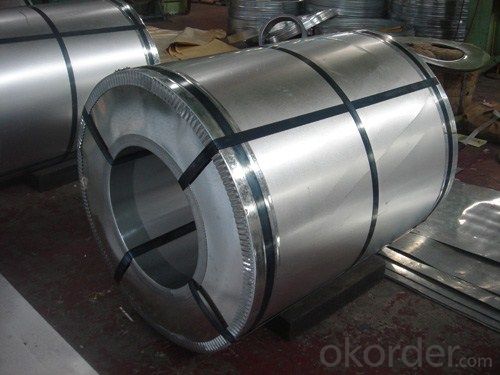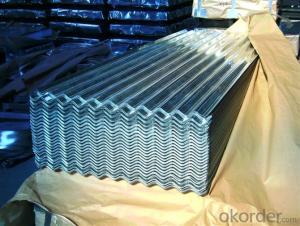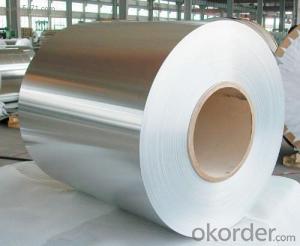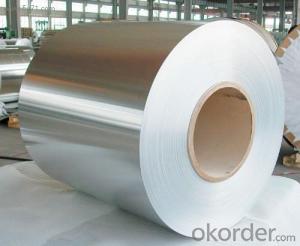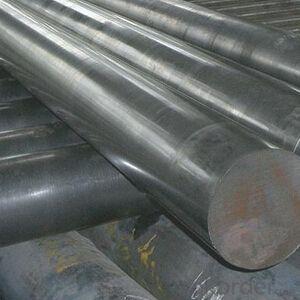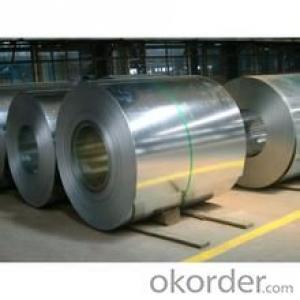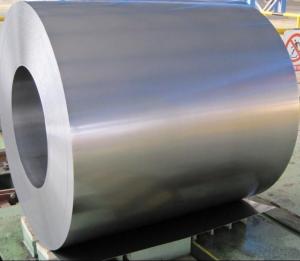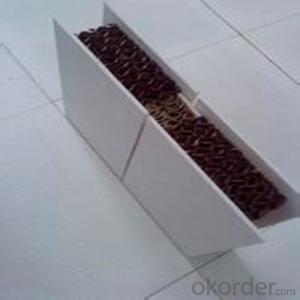Hot-dip Zinc Coating Steel Building Roof Sheets in Coil Prime Quality
- Loading Port:
- Tianjin
- Payment Terms:
- TT OR LC
- Min Order Qty:
- 50 m.t.
- Supply Capability:
- 10000 m.t./month
OKorder Service Pledge
OKorder Financial Service
You Might Also Like
1.Structure of Hot-Dip Galvanized Steel Sheet Description:
Hot-dip galvanized steel coils are available with a pure zinc coating through the hot-dip galvanizing process. It offers the economy, strength and formability of steel combined with the corrosion resistance of zinc. The hot-dip process is the process by which steel gets coated in layers of zinc to protect against rust. It is especially useful for countless outdoor and industrial applications. Production of cold formed corrugated sheets and profiles for roofing, cladding, decking, tiles, sandwich walls, rainwater protective systems, air conditioning duct as well as electrical appliances and engineering.
2.Main Features of the Hot-Dip Galvanized Steel Sheet:
• Excellent process capability
• Smooth and flat surface
• Workability, durability
• Excellent anticorrosive property
• High strength
• Good formability
• Good visual effect
3.Hot-Dip Galvanized Steel Sheet Images
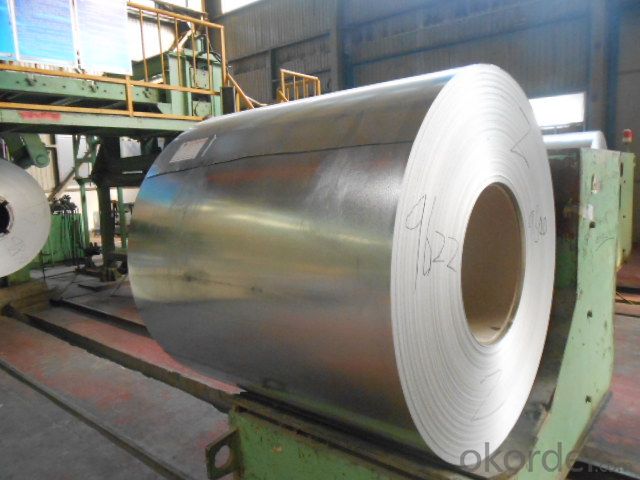
4.Hot-Dip Galvanized Steel Sheet Specification
Standard: ASTM, JIS,EN
Grade: CS, DX51D+Z,SGCC, SS 230~550,S220GD+Z~S550GD+Z, SGC340~SGC570
Thickness: 0.1mm~5mm
Width: max 2000mm
Coil weight:3-12 MT
Coil ID:508/610mm
Surface structure: zero spangle, regular spangle or minimum spangle
Surface treatment: Chromate treatment, Oiled/dry, skinpassed/non-skinpassed
Packing: Standard seaworthy export package
Technology test results:
Processability | Yield strength | Tensile strength | Elongation % | 180°cold-bending |
Common PV | - | 270-500 | - | d=0,intact,no zinc removal |
Mechanical interlocking JY | - | 270-500 | - | d=0,intact,no zinc removal |
Structure JG | >=240 | >=370 | >=18 | d=0,intact,no zinc removal |
Deep drawn SC | - | 270-380 | >=30 | d=0,intact,no zinc removal |
EDDQ SC | - | 270-380 | >=30 | d=0,intact,no zinc removal |
5.FAQ of Hot-Dip Galvanized Steel Sheet
We have organized several common questions for our clients,may help you sincerely:
1.How about your company?
A world class manufacturer & supplier of castings forging in carbon steel and alloy steel,is one of the large-scale professional investment casting production bases in China,consisting of both casting foundry forging and machining factory. Annually more than 8000 tons Precision casting and forging parts are exported to markets in Europe,America and Japan. OEM casting and forging service available according to customer’s requirements.
2.How to guarantee the quality of the products?
We have established the international advanced quality management system,every link from raw material to final product we have strict quality test;We resolutely put an end to unqualified products flowing into the market. At the same time, we will provide necessary follow-up service assurance.
3. How long can we receive the product after purchase?
Usually within thirty working days after receiving buyer’s advance payment or LC. We will arrange the factory manufacturing as soon as possible. The cargo readiness usually takes 15-30 days, but the shipment will depend on the vessel situation.
- Q: Can the steel sheets be easily folded or creased?
- It is not possible to easily fold or crease steel sheets. Steel, being a robust and inflexible material, demands considerable force for bending or creasing. Its durability and resistance to deformation make it a popular choice in construction and manufacturing. Nevertheless, if the steel sheets are sufficiently thin, they might have enough malleability to be bent or creased by utilizing suitable tools and techniques.
- Q: Are steel sheets available in custom sizes?
- Yes, steel sheets are available in custom sizes.
- Q: Are steel sheets suitable for HVAC systems?
- Yes, steel sheets are suitable for HVAC systems. Steel sheets are commonly used in HVAC systems due to their durability, strength, and resistance to corrosion. They provide structural integrity to the system and can withstand high temperatures and pressure. Additionally, steel sheets are easy to fabricate and can be customized to fit specific HVAC system requirements. They are also cost-effective and have a long lifespan, making them a preferred choice for HVAC system components such as ductwork, ventilation systems, and air handling units.
- Q: Can the steel sheets be used for industrial machinery?
- Yes, steel sheets can be used for industrial machinery. Steel is a popular choice for the construction of industrial machinery due to its high strength, durability, and resistance to wear and tear. Steel sheets can be shaped, cut, and welded to create various components and parts required in industrial machinery. The versatility of steel allows manufacturers to design and fabricate machinery with precise specifications and requirements. Moreover, steel's ability to withstand heavy loads, extreme temperatures, and corrosive environments makes it suitable for use in a wide range of industrial applications.
- Q: Do steel sheets have any magnetic properties?
- Indeed, magnetic properties are possessed by steel sheets. Steel, which is an alloy primarily composed of iron, carbon, and other elements, exhibits ferromagnetism. This characteristic enables it to be magnetized and attract magnets. Nevertheless, the extent of magnetism in steel can differ based on its composition and processing. Certain steel alloys can be effortlessly magnetized and retain their magnetism even after the removal of the applied magnetic field, while others may display lower magnetic properties. Furthermore, the presence of impurities and the specific heat treatment process can also impact the magnetic properties of steel. In summary, steel sheets can display magnetic properties; however, the degree of magnetism may fluctuate depending on the specific type and composition of the steel.
- Q: Are the steel sheets suitable for welding or fabrication purposes?
- Steel sheets are indeed appropriate for welding or fabrication purposes. Steel is a versatile material that finds application in a wide range of industries, such as construction, automotive, and manufacturing. When it comes to welding and fabrication, steel sheets serve as a sturdy and long-lasting foundation. They can be easily manipulated through cutting, shaping, and welding techniques like arc welding, MIG welding, or TIG welding. Steel sheets possess outstanding structural integrity and can endure extreme temperatures and mechanical strain during the welding or fabrication process. Moreover, they are obtainable in various thicknesses and grades, enabling customization in accordance with particular welding or fabrication prerequisites.
- Q: How do steel sheets perform in terms of fire resistance?
- Steel sheets have excellent fire resistance properties. Due to their high melting point and low thermal conductivity, they can withstand high temperatures and prevent the spread of fire. Additionally, steel sheets do not contribute to the fuel load of a fire, making them a reliable choice for fire-resistant structures.
- Q: How thick are steel sheets available?
- A wide variety of thicknesses can be found for steel sheets, catering to the specific needs of each application. Steel sheets commonly come in thicknesses ranging from 0.5mm (or 0.020 inches) up to several inches. Gauge is typically used to measure the thickness of steel sheets, with lower gauge numbers indicating thicker sheets. Nevertheless, it's worth mentioning that the availability of steel sheets in particular thicknesses might differ depending on the supplier and the type of steel employed.
- Q: How do steel sheets perform in flexural strength?
- Steel sheets have excellent flexural strength due to the material's inherent properties, such as high tensile strength and toughness. They are capable of withstanding significant bending or flexing without permanent deformation, making them ideal for applications that require structural stability and resistance to external forces.
- Q: How do steel sheets perform in terms of sound absorption?
- Steel sheets are not known for their sound absorption capabilities. They tend to reflect and resonate sound rather than absorb it, making them less effective in reducing noise.
Send your message to us
Hot-dip Zinc Coating Steel Building Roof Sheets in Coil Prime Quality
- Loading Port:
- Tianjin
- Payment Terms:
- TT OR LC
- Min Order Qty:
- 50 m.t.
- Supply Capability:
- 10000 m.t./month
OKorder Service Pledge
OKorder Financial Service
Similar products
Hot products
Hot Searches
Related keywords
